Gianfranco Rosi and I met for the first time at the Film Society of Lincoln Center in 2014 for a conversation on Sacro GRA and last month we had a post-screening discussion on the opening weekend for his latest film, Italy's Oscar submission, Fire At Sea (Fuocoammare), at Lincoln Plaza Cinemas, now playing side-by-side with Michael Moore's Hillary Clinton plaidoyer, Michael Moore In Trumpland, two days before the Presidential election.
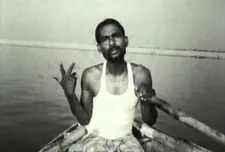 |
| Gopal in Boatman: "So the film is this hypothetical day on the Ganges. As I say, it took forever." |
This past week after the screening of Boatman during the BAMcinématek Presents Gianfranco Rosi retrospective featuring the director's early films Below Sea Level and El Sicario, Room 164, we had a conversation in a BAM Rose Cinemas theatre that led us to Jean Vigo's L'Atalante, Michael Jackson, Lotte Reiniger, and Italo Calvino's Invisible Cities.
Shot by Gianfranco Rosi in the city of Benares or Varanasi in Northern India over several years, the documentary captures a single day of a tourist on a boat which becomes a microcosm of the world. The film is beautiful and terrifying, making us laugh and shiver within a wave of the Ganges. A cow eats the flower wreath off the dead body of a man. Women wash their hair next to a boy giving his bicycle a rinse-off in the sacred waters. Nearby, corpses are floating, a new movie is being announced and a boat sells trinkets to foreigners. Boatman plunges into life and death in the same river.
There is no fire burial for beggars, we learn. In a crematorium on the banks, a girl - with the air of the original Cinderella - pushes a leg into the flames. A group of boys, skinny and nimble climb and dance over and under a makeshift bridge. The Ganges, according to the ancient Hindu myth, was tamed by god Shiva who let the river flow through his hair. Rosi can be heard asking questions to a number of people he encounters. We need no background information. The boatman, the light and the water speak volumes, mysterious and ancient and still loud and clear 25 years later.
_225.webp) |
| Anne-Katrin Titze in conversation with Gianfranco Rosi on Boatman at BAMcinématek: "It's fantastic to see the grain. Welcome to the grain!" Photo: Emilie Spiegel |
Anne-Katrin Titze: You said you haven't seen the film in a very long time.
Gianfranco Rosi: Over 23 years, yes.
AKT: And you watched it tonight. So what did you see?
GR: Actually, I saw the film because I always say I will not see the films - I tend to keep the things in my mind. The good and the bad things about this film. Sometimes I dream about my films getting completely lost and not to be watched anymore. And this was very close to [happening]. Because the negative disappeared from the lab where I did the mix and everything. Apparently it went bankrupt.
They didn't keep my negative, it was probably too long there. I don't know what happened. Recently, we found one print of the film and from this print we were able to do this. It's fantastic to see the grain. Welcome to the grain! Because the grain disappeared completely from cinema.
AKT: Yeah, we're not used to it anymore.
GR: There's no more grain and there's no texture. It's completely different. So to see something like that, it looks like this film was so, so old. Not merely 20 [plus] years ago. So this is an incredible gap of time and gap of texture. That made me think a lot about how our language also changed. I remember at the time the film looked fantastic. The grain was absolutely accepted and now it becomes like, hmm, it's really old the film.
![On Boatman: "Sometimes I dream about my films getting completely lost and not to be watched anymore. And this was very close to [happening]."](/images/newsite/Boatman_225.webp) |
| On Boatman: "Sometimes I dream about my films getting completely lost and not to be watched anymore. And this was very close to [happening]." |
Also when I did the film, I wanted this film completely timeless. That's why I made it in black and white. I wanted the film to have really no space and time. I remember when Jim Jarmusch saw this film many years ago, he thought this film was shot in the Fifties from an Italian completely unknown filmmaker. And then was very disappointed when he found out that someone who is still alive had made this film. Jarmusch was not disappointed but he loved the film very much and he was looking for who's the director. And there was this young kid and the film looks like it was made fifty years ago. So it was kind of funny.
AKT: The scene with the boys on the bridge - that I felt was even older than that. It reminded me of Lotte Reiniger shadow puppets. The first animated movie from the Twenties.
GR: Or the dance is Michael Jackson there.
AKT: Yeah, Michael Jackson and Lotte Reiniger! Can you talk a little bit about that sequence?
GR: That sequence was very painful to film. You have to understand also when you're shooting with film, every ten minutes of film is bloody expensive. It's like $400 every ten minutes. So you really think a lot before you put your camera there. I only shot eleven hours, filming three, four years, maybe five years time. Because I could go to India only twice a year and so it was this long, long journey. We can talk about how it started - the film - that might be interesting too.
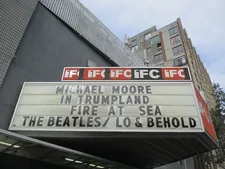 |
| Fire At Sea (Fuocoammare) and Michael Moore in TrumpLand at the IFC Center Photo: Anne-Katrin Titze |
AKT: Absolutely.
GR: But anyhow, that sequence. There was a moment when the bridge was separated still. So we went under the shade there. There were two sequences in the film there. Once when it was really the bridge, so there is the cars passing by and the kids. And then I wanted to shoot some more film and the bridge was not there anymore.
And I went there and the kids came again and so it became these two sequences in one moment. That's a fantastic moment, this lightness, this incredible thing. Those kids are everywhere. I spent the whole day with Gopal [the boatman]. Gopal was really victimized - for one month we spent the whole day. This was all to recreate the moment that I spent with him as a tourist. To recreate it emotionally. If you want, we can talk about how the film started?
AKT: Yes, please, tell us how it all began.
GR: [Before] I went to Benares, I did a short film. I was a student at NYU and I made a short film in Miami. It was a ten minute film that I made for my school. It was like the contact with water, old people and death in Miami. I shot this 5, 10 minute piece with just water, contact with water. Miami 25 years ago used to be a place full of retired people, then it became a fashion place.
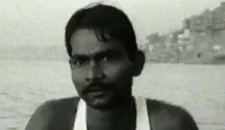 |
| On meeting Gopal: "So I went to the river, which I never did before and there I was looking for a boatman." |
AKT: So water and death - that's your thing?
GR: Someone saw the film and told me "that reminds me of Benares." And then I had a chance to go to Benares and I brought my camera there. At the beginning I didn't really have the knowledge of being a cameraman. So this was really my own first approach with cinema. When I went there, I spent probably a whole month in Benares running around with my camera, walking every day trying to find something to film. And I was not able to. In a way I had to interiorate what was the essence of this place. Benares is the city of death. It is this place, the only place in the world where alive people and dead people dwell in the same grounds.
Suddenly there's a dead body!
When I arrived in India, the first day, there was a strike. There was a fight between Muslims and Hindus. When I arrived at the airport, there were no taxis. I had a hotel that someone recommended to me. I remember I was in the street with my camera, with my backpack and I couldn't get a taxi to go to the hotel. I started hitchhiking. Suddenly this truck stopped by and they were the only ones allowed because it was curfew.
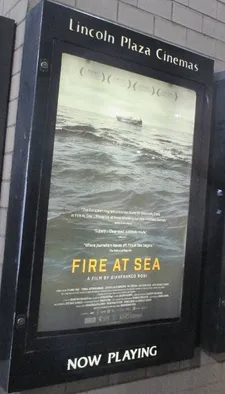 |
| Fire At Sea poster at Lincoln Plaza Cinemas Photo: Anne-Katrin Titze |
The truck was allowed because it had a dead body inside, which I didn't know. It stopped, I got in with my luggage and things and there's a dead body there. I took the whole journey from the airport to the hotel with the dead body there. It was the first time I saw death in my life. For us, death is such a taboo. In India, death is like part of life.
AKT: And it never let you go for your films! I mean, your latest one, again.
GR: Death! Yeah, that's true.
AKT: Death and water.
GR: You see that's why I don't watch my films anymore! The subjects of a psychopath [laughing]. No. It was interesting, because suddenly I saw this place. To me it was like a Calvino Invisible City. I wanted it to become a place of the mind more than the place itself. So for a month I went around, I was not able to shoot one single frame. Every day with the camera from morning till night, walking, walking, walking, walking.
Three days before leaving by airplane - I had to go back to New York - at the time I was living in New York - and I said - today I will be like a tourist. I leave my camera in the hotel and do what tourists do. I go and take a boat.
So I went to the river, which I never did before and there I was looking for a boatman. And I meet Gopal. And he was, as he says, "cheating tourists" constantly. So I bargained a price for half an hour and he gave me a price which was not acceptable but I said okay. Then this half an hour became an hour, then became three hours, then I spent with him the whole day.
And when I went back to my hotel that night, I started thinking about this day that I spent with him from morning till night. And I said - that's the movie I want to do. One day in a boat where I don't have to justify anything because I'm just a tourist. So I don't have to give any kind of background, it's just one day on the river in the boat with this boatman.
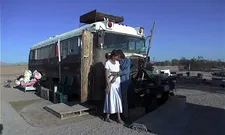 |
| Gianfranco Rosi's Below Sea Level |
The next day, I went to look for him and I encountered him. The first scene you see him, I'm going to the boat and the last scene when I pay him the money is what I shot in that day. That day, I shot all the rolls I had. It was like three, four, five hours of rolls and I shot them all. It was a total disaster. Maybe there are three scenes in the film that stayed there in the editing. And of course, I wanted to make the film in one day, which was impossible.
So I went back to New York and after months I didn't print the footage and then finally I do and some moments were really fantastic. But there was no film. Maybe four good scenes in the whole thing. There was no way I could edit a day. So since then it became this obsession of going back to India.
AKT: To fill in the rest of the day?
GR: To fill in this memory that I had. So, every time I had some money, I had some time, I was going to India - look for the same boatman. There was no phone, there was nothing. So you make this long journey from New York to Benares with all your camera, all your things and hopefully you find him. I did. Every time I did. For five years or four years.
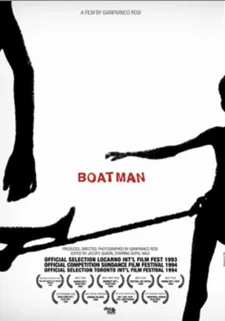 |
| Boatman poster |
And over time he sees me arrive, he is, "Oh shit". Because he knew I would spend the whole month with him on the boat, you know, pretending it was still this tourist of the first day. Someone who saw the film - it came out in Sundance - I remember that person saying: "How lucky you were to shoot this film in one day".
AKT: And you pack the whole world, the whole universe into one day.
GR: It's an emotional reconstruction of that day spent. So the film is this hypothetical day on the Ganges. As I say, it took forever. And people whenever I said, I'm going back to India to make this film, nobody anymore believed that because it's totally crazy… The sound was a mess because there was no slate.
AKT: The sound is fantastic.
GR: It was shot with this Sony recorder with a cassette … I remember how precious was that film. Every scene had to be so important. It was like the first scene ever shot in the history of cinema.
AKT: You have a lot of that in it. There is a moment where I thought of L'Atalante. That girl on the boat and the music while she is washing her hair … Limitations are good sometimes, no? Obstructions?
GR: Yeah, you have to wait always for the right moment. I could not film constantly, so when I film, I had to know that this was the right moment to put the camera and film something about to happen which is strong, hopefully. Unfortunately in Fire At Sea, death is a tragedy. It's a political statement.
Fire At Sea will screen in the DOC NYC Short List program on November 12 at 12:45pm - Cinepolis Chelsea - Expected to attend: Gianfranco Rosi
Fire At Sea (Fuocoammare) and Michael Moore In TrumpLand, directed by Moore continue to run at the IFC Center and Lincoln Plaza Cinemas.








_600.webp)













